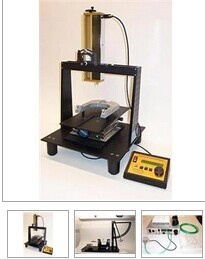|
参考报价:电议 型号:
产地:美国 在线咨询
|

创伤性脑损伤(Traumatic Brain Injury,TBI)是神经外科*常见的疾病,是导致创伤患者伤残及死亡的主要原因。研究脑损伤后的神经生化、神经病理生理等方面的变化,可为探索行之有效的脑保护治疗提供帮助,将有助于提高颅脑损伤患者的生存率及生存质量。
VCU动物颅脑损伤仪分为液压冲击损伤仪(FPI),细胞损伤控制仪(CIC)和电子脑皮质挫伤撞击仪(eCCI)。这三种产品已经广泛应用于世界范围内的颅脑创伤研究中心,是目前颅脑创伤模型制作的金标准。同时FPI损伤仪还可应用到眼科损伤模型,CIC细胞损伤仪可以应用到其它种类细胞损伤模型的制作。
液压颅脑损伤仪(FPI)
液压冲击损伤仪(Fluid Percussion Injury)主要针对神经创伤机制研究。它成为全球研究神经创伤广泛使用的仪器,可以重复一致地产生液压冲击损伤(FPI)。
系统优点:
可方便的排除气泡;
角度刻度可方便观察撞击角度;
集成压基准力输出,方便校准。
精确输出冲击压力;
配备高精度的压力传感器
电子颅脑损伤仪(eCCI)电子大脑皮质挫伤撞击仪 (electric Cortical Contusion lmpactor),主要针对脑皮质挫伤模型,是神经损伤研究机构****的损伤模型制作工具。动物平台可以和各种立体定位仪搭配使用。
由VCU大学设计制作的电子大脑皮质挫伤撞击仪,主要针对脑皮质挫伤模型。其组件有:坚固的铝架、动物平台、撞击控制器和撞击头。动物平台可以和各种立体定位仪搭配使用。由高级线性马达驱动的撞击头,可以由控制器来控制撞击参数,实现不同程度的损伤。撞击头含有感应器,可以确定速率、撞击深度及撞击停留。
.
与传统Feeney's自由落体硬膜外撞击方法相比有以下优点:可精确连续地控制撞击速度,并获得实际撞击深度和停留时间等参数,而非重量差异很大的撞击。可精确重复制作挫伤损伤模型,减少动物死亡,使实验过程更加直观,可控。
The eCCI is constructed with a sturdy aluminum frame to maximize rigidity, thereby ensuring impact accuracy. The support base, animal platform and impactor head are anodized to prevent oxidation and assure equipment longevity.
Product assembly includes the base and support frame, and adjustable animal positioner with an aluminum animal platform to be used in conjunction with a variety of stereotactic mounts. This model utilizes the enhanced linier motor driven impactor and controller. The enhanced impact head also houses a photo-optic sensor to determine velocity, impact depth and dwell, and is extremely reproducible.
细胞颅脑损伤仪(CIC)
细胞损伤控制仪(CI採取电子式控制,適合morphologic、病理理及培养组织损伤后的机制、形态学、病理性。细胞损伤控制仪是针对Flexcell Int’l corp具有**的tissue culture system。细胞损伤控制仪平均把压缩气体送到每个culture wells,以造成培养组织牵张性的损伤,损伤的严重程度是依据气体在密闭的culture well进出的量,细胞损伤控制仪(CIC)是可以搭配Flex ® 29.45cm2 culturing trays I (针对VCU早期的细胞损伤控制仪)和BioFlex® 57.75cm2 culturing trays。因为根据所採用的细胞种类、损伤的程度、培养的狀況,受损后的细胞或许会因为上述因素死掉或要修护,所以VCU的细胞损伤控制仪(CIC)很適合应用在下列领域:细胞受损、修护,死亡,药物介入的反应。
Depending on the cell type, the degree of injury and the culture conditions, the injured cells may die or repair. Therefore, the system can be employed to study the responses to trauma, including cell injury, repair, death or pharmacologic intervention.
The CIC II has been designed for use with a patented, commercially available tissue culture system from Flexcell International Corp. in Hillsborough, N.C. Tissue cultures are grown in culturing wells with stretchable Silastic® membrane bottoms. The CIC II regulates the flow of compressed gas to rapidly pressurize individual culture wells, causing a radial stretch injury to the culture. Injury severity is determined by controlling the flow of gas in and out of the sealed culture well and the peak pressure is captured to provide an accurate indicator of radial stretch.
The CIC II accepts both the Flex I® 29.45cm2 culturing trays, which were used with the earlier CIC Model 94A, and the BioFlex® 57.75cm2 culturing trays.